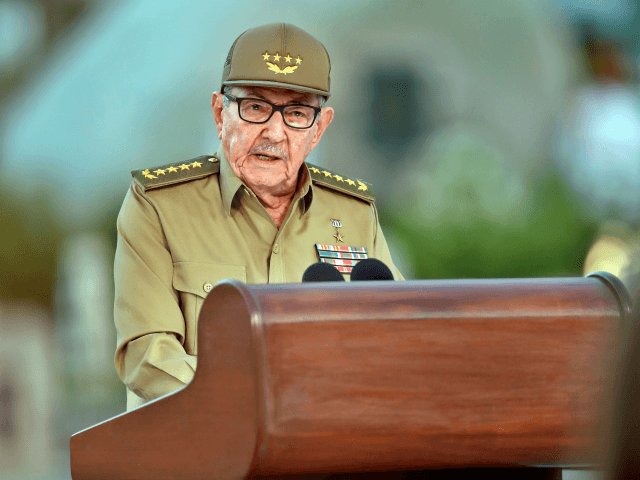Cuban dictator Raúl Castro surfaced Tuesday to deliver a speech marking the 60th anniversary of the Cuban Revolution, which succeeded on New Year’s Day 1959. He chose the moment to blame the United States and its “merciless neoliberal policies” for poverty in Latin America.
Castro addressed a crowd of Communist Party officials in the eastern city of Santiago de Cuba, the Castro family’s hometown and where late dictator Fidel Castro is buried.
While Castro, the head of the Cuban Communist Party and commander-in-chief of the nation’s armed forces, dedicated much of his speech to praising late brother Fidel, the main message of his address was that Cuba’s youth must remain ever vigilant against the United States, particularly under the current Trump administration. America, Castro alleged, “has spent 12 administrations unceasingly putting effort into forcing regime change in Cuba using one method or another, with more or less aggression.”
“Now, once again, the American government appears to take the route of confrontation with Cuba and present our peaceful and allied country as a threat to the region,” Castro claimed. “High-ranking administration officials, with the complicity of some lackeys, disseminate new falsehoods and once again attempt to blame Cuba for all the ills of the region, as if these were not the consequence of merciless neoliberal policies.”
He blamed the United States not just for hardships in Cuba, but for the collapse of the socialist establishment in Brazil, where the ruling Workers’ Party (PT) fell to a small conservative party led by now President Jair Bolsonaro. “They,” Castro said without specifying, “managed to imprison Comrade Lula da Silva and deprive him of his right to be a presidential candidate.”
Lula da Silva, former PT president, was arrested in 2017 on charges of taking over $1 million in bribes and, after multiple appeals, was sentenced to 12 years in prison last year. Supporters insisted that his prison sentence should not keep him off the ballot to reclaim the presidency despite the law banning politicians convicted of corruption from running.
Castro claimed that “neoliberal policies,” by which he means capitalist, free-market economics, lead to “poverty, hunger, inequality, organized crime, drug trafficking, political corruption, abuse, and the deprivation of workers’ rights.”
Cuba in 2019, he concluded, was “a free and independent country, master of its own destiny.”
Castro made his remarks amid a collapsing economy where the average Cuban spent hours on market lines to buy bread for the holidays, as the regime failed to meet the necessary wheat quotas to feed the country. Miguel Díaz-Canel, Castro’s deputy and “president” of Cuba, blamed President Donald Trump for the food shortages, though the government’s official explanation for the wheat shortage was that several mills nationwide broke down in December and the government had no way of procuring replacement parts for them.
Díaz-Canel delivered a year-end speech on Monday with a much more somber outlook on the future of Cuba, particularly regarding its failed socialist economy. Addressing the national legislature, he ordered high-ranking communist leaders to practice “austerity” in their expenses while doing their job, asserting, “we don’t need a lot of resources” to get the job done.
“The leadership of the Cuban Communist Party decidedly backs the pronouncements and actions ordered by Comrade Díaz-Canel,” Castro said on Tuesday, referring to the austerity comments. He urged Cuban officials to “reduce all non-essential costs and save more, increase and diversify exports, elevate efficiency in the investment process, and attract more foreign investment.”
Like Díaz-Canel, Castro blamed the United States for the need to rethink Cuba’s economic policies, particularly regarding government spending.
It remains unclear whether this new “austerity” program will affect all, or any, of the Castro regime’s highest-ranking members. Díaz-Canel’s comments followed the worldwide publication of photos of Mariela Castro, Raúl’s daughter and head of the government’s LGBT agency, eating at lobster feast this month with Spanish pop singer Pastora Soler. Observers condemned the optics of the daughter of a dictator eating a lavish dinner in a country where the monthly average salary is $30 a month.
In addition to Mariela, brother Alejandro Castro Espín runs the nation’s spy agency and holds a high ranking in the nation’s Interior Ministry.
Raúl Castro ended his speech with a warning to the United States and opponents of his dictatorship: “we are not intimidated by strength or threats, they did not intimidate us when the revolutionary process was not consolidated, and they will not even remotely be able to do so now that the unity of the people is an indestructible reality.”

COMMENTS
Please let us know if you're having issues with commenting.